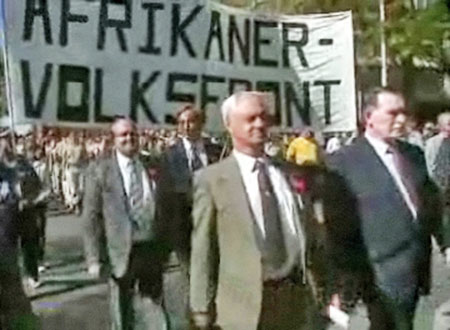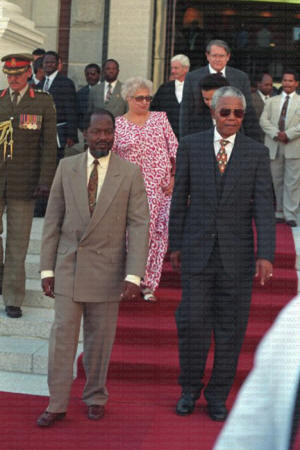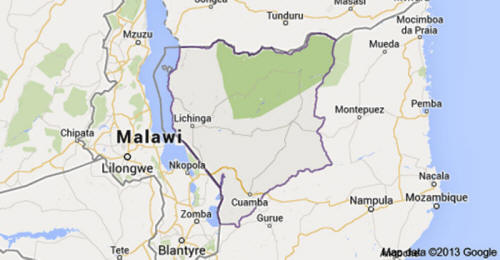
by Prof Michel Chossudovsky
December 13, 2013
from
GlobalResearch Website
This article was
first published in French in Le Monde Diplomatique in April 1997.
It was subsequently
published in the African Journal of Political Economy and in the
author’s book:
The Globalization of Poverty and the New World
Order.

The policy of land expropriation in Mozambique leading to the
establishment of White Afrikaner farms using indentured Mozambican
farm workers had the support of the ANC government.
It also had the the personal blessing of
President Nelson Mandela,
"who had delegated Mpumalanga
Premier Matthews Phosa to the SACADA Board of Governors.
Premier Phosa, a distinguished ANC politician and among the most
prosperous black businessmen in Mpumalanga province (East
Transvaal), contributed to laying the political ground work for
the expansion of White Afrikaner business interests into
neighboring countries.
The SACADA project was coordinated by the leader of the right
wing Freedom Front and former South African Defense Force Chief
General Constand Viljoen

Viljoen developed a close personal relationship with Nelson
Mandela. He had convinced Mandela that promoting White Afrikaner
farms in neighboring countries 'would provide food and
employment for locals'.
What was not discussed was that this
ANC government policy implied a de facto process of land
expropriation which went against the basic tenets of the ANC’s
struggle for land rights for African peasants.
From the outset, international corporate agribusiness and the
World Bank were involved in this project. It is worth noting
that during the period of 'Transition' preceding the 1994
presidential elections, General Constand Viljoen had been
"plotting an Afrikaner guerrilla war against multiracial rule".
(Financial Times, December
5, 2013)
While Mandela "believed in action"…
at the core of [his] militancy was always a desire to get the
white colonial regime to come to the table and talk."
(Mail and Guardian,
December 12, 2013).
This stance largely characterized his
relationship with General Viljoen.
It is worth noting that in the 1980s General Viljoen as Chief of the
South African Defence Force led South African troops into Angola. In
1993, he participated in the establishment of the Right wing racist
Afrikaner Volksfront (AVF).
He later formed the Freedom Front Party
which presented candidates to the April 1994 elections.

The article on 'Exporting apartheid' was the object of controversy.
Its publication in Le Monde Diplomatique in April 1997
coincided with the hearings of the South Africa Truth Commission led
by Rev Desmond Tutu, which focused on the role of General Constand
Viljoen as South African Defense Force Chief during the Apartheid
period.
(General
Viljoen testified in May 1997 before the Truth
Commission).
The article was the object of a June 1997 law suit claiming
defamation directed against the author and Le Monde Diplomatique
by the 'South African Chamber for Agricultural Development' (SACADA)
and the leader of the Freedom Front and former SADF Chief General
Constand Viljoen.
The law suit launched in Paris was subsequently thrown out by the
Paris Court of Justice.
Michel Chossudovsky
December 12, 2013
Exporting Apartheid
...to Sub-Saharan Africa
by Michel Chossudovsky
The right wing Afrikaner Freedom Front
(FF) headed by General Constand Viljoen plans to develop a "Food
Corridor" extending across the Southern part of the continent from Angola to
Mozambique.
Afrikaner agri-business is to extend its grip
into neighboring countries with large scale investments in commercial
farming, food processing and eco-tourism. The agricultural unions of the
Orange Free State and Eastern Transvaal are partners; the objective is to
set up White-owned farms beyond South Africa’s borders.
The "Food Corridor," however, does not mean "food for the local people." On
the contrary, under the scheme the peasants will lose their land, with
small-holders becoming farm labourers or tenants on large scale plantations
owned by the Boers.
Moreover, the South African Chamber for
Agricultural Development (SACADA) which acts as an umbrella organization
also includes, centrally, several right wing organizations including the
Freedom Front (FF) led by Viljoen, whose grim record as South African
Defence Force (SADF) Commander in Chief during the Apartheid regime is well
known.
The Freedom Front, although "moderate" in comparison to Eugene
Terre’Blanche’s far-right Afrikaner Weerstandsbeweging (AWB), is a
racist political movement committed to the Afrikaner Volksstaat.
The SACADA-Freedom Front initiative has
nonetheless the political backing of the African National Congress as well
as the personal blessing of President Nelson Mandela who has
delegated Mpumalanga Premier Matthews Phosa to the SACADA Board of
Governors.
All the other governors are members of the
Freedom Front.
Premier Phosa, a distinguished ANC politician
and among the most prosperous black businessmen in Mpumalanga province (East
Transvaal), has also contributed to laying the political ground work for the
expansion of White Afrikaner business interests into neighboring countries.
In discussions with President Mandela, General Viljoen had argued that,
"settling Afrikaner farmers would stimulate
the economies of neighboring states, would provide food and employment
for locals, and that this would stem the flow of illegal immigrants into
South Africa."
Viljoen has also held high level meetings on
Afrikaner agricultural investments with representatives of the European
Union, the United Nations and other donor agencies.
In turn, Pretoria is negotiating with several African governments on behalf
of SACADA and the Freedom Front. The ANC government is anxious to facilitate
the expansion of corporate agri-business into neighboring countries.
As one newspaper account affirms,
"Mandela has asked the Tanzanian government
to accept Afrikaner farmers to help develop the agricultural sector"
while SACADA itself has approached some 12 African countries "interested
in White South African farmers."
In a venture set up in 1994 under the South
African Development Corporation (SADEVCO), the government of the Congo
had granted to the Boers 99 year leases on agricultural land.
President Mandela endorsed the scheme calling on
African nations,
"to accept the migrants as a kind of foreign
aid."
The African host countries have on the whole
welcomed the inflow of Afrikaner investments.
With regard to regulatory policies, however, the
Bretton Woods institutions and the World Trade Organization (WTO) (rather
than national governments) call the shots, invariably requiring (indebted)
countries to accept,
"a wide open door to foreign capital."
In this context, the liberalization of trade and
investment under donor supervision, tends to support the extension of
Afrikaner business interests throughout the region.
Moreover, in the sleazy environment shaped by
transnational corporations and international creditors, corrupt politicians
and senior bureaucrats are often co-opted or invited to become the "business
partners" of South African and other foreign investors.
The expropriation of
peasant lands
The "Food Corridor" initiative will displace a pre-existing agricultural
system:
it not only appropriates the land, it takes
over the host country’s economic and social infrastructure and, almost
inevitably, spells increased levels of poverty in the countryside.
It will most likely provide a fatal blow to
subsistence agriculture as well as to the peasant cash crop economy,
displacing local level agricultural markets and aggravating the conditions
of endemic famine prevailing in the region.
As if this were not enough, Jen Kelenga,
a spokesperson for a pro-democracy group in Zaire, also sees, at the heart
of the initiative, the Boers,
"in search of new territories to apply their
racist way of living."
The "Food Corridor" if carried through, could
potentially alter the rural landscape of the Southern African region,
requiring the uprooting and displacement of small farmers over an extensive
territory.
Under the proposed scheme, millions of hectares
of the best farmland would be handed over to South African agri-business.
The Boers are to manage large scale commercial farms using the rural people
both as "labor tenants" as well as seasonal agricultural workers.
Such initiatives also dovetail with
World Bank directives regarding land-use in
the region. Indeed, the Bank has pressed for land legislation throughout
Sub-Saharan Africa that would abrogate the right to land of millions of
small-holders, with identical land legislation now being enforced throughout
the region.
The national level land laws (drafted under
technical advice from World Bank Legal Department) are with some variations
"exact carbon copies of each other":
"The constitution [in Mozambique] says that
the land is the property of the State and cannot be sold or mortgaged.
There has been strong pressure particularly from the United States and
the World Bank for land to be privatized and to allow mortgages…"
Under the proposed land legislation, both SACADA
and the World Bank nonetheless tout the protection of traditional land
rights.
The small peasantry is to be "protected" through
the establishment of "customary land reserves" established in the immediate
vicinity of the White commercial farms. In practice, under the new land
legislation, the majority of the rural people will be caged into small
territorial enclaves ("communal lands") while the bulk of the best
agricultural land will be sold or leased to private investors.
This also means that peasant communities which practice shifting cultivation
over a large land area, as well as pastoralists, will henceforth be
prosecuted for encroaching on lands earmarked for commercial farming, often
without their prior knowledge.
Impoverished by the macro-economic reforms, with
no access to credit and modern farm inputs, these customary enclaves will,
as noted, constitute "labor reserves" for large scale agri-business.
Afrikaner farms in
Mozambique
SACADA has plans to invest in Mozambique, Zaire, Zambia and Angola,
"with Mozambique being the test case."
President Joaquim Chissano of Mozambique
and President Nelson Mandela (1994 picture below) signed an
intergovernmental agreement in May 1996 which grants rights to Afrikaner
agri-business to develop investments in at least six provinces encompassing
territorial concessions of some eight million hectares.

According to one South African official:
"Mozambique needs the technical expertise
and the money, and we have the people… We favor an area which is not
heavily populated because it is an Achilles heel if there are too many
people on the land… For the Boers, Land is next to God and the Bible."
In SACADA’s concessionary areas in Mozambique,
the Frelimo government will ensure that there is no encroachment; rural
small-holders and subsistence farmers (who invariably do not possess legal
land titles) will either be expelled or transferred into marginal lands.
In Mozambique’s Nissan province, the best agricultural land is to be leased
in concession to the Afrikaners for fifty years. At the token price of some
$0.15 per hectare per annum, the land lease is a give-away.
Through the establishment of
Mosagrius (a joint venture company), SACADA
is now firmly established in the fertile valley of
the Lugenda river.
But the Boers also have their eyes on
agricultural areas along the Zambezi and Limpopo rivers as well as on the
road and railway facilities linking Lichinga, Niassa’s capital to the deep
seaport of Nagala.
The railway line is being rehabilitated and
modernized (by a French contractor) with development aid provided by France.
In the initial stage of the agreement, concessionary areas in Niassa
province were handed over to SACADA in 1996 to be settled by some 500 White
Afrikaner farmers. These lands are earmarked for commercial farming in both
temperate
highveld and sub-tropical lowveld. The
available infrastructure including several state buildings and enterprises
will also be handed over to the Boers.
The Boers will operate their new farms as part of their business
undertakings in South Africa, dispatching White Afrikaner managers and
supervisors to Mozambique.
The Boers will bring from South Africa their
Black right-hand men, their tractor operators, their technicians.
In the words of the project liaison officer at
the South African High Commission in Maputo:
"Each and every Afrikaner farmer will bring
his tame Kaffirs" who will be used to supervise the local workers.
The number of White settlers in the
concessionary areas in Niassa is likely to be small.
SACADA has carefully mapped out the designated areas by helicopter, South
Africa’s agricultural research institutes have surveyed the area, providing
an assessment of environmental as well as social and demographic conditions.
Creating "rural
townships"
Under the SACADA scheme, the rural communities in Niassa which occupy the
Afrikaner concessionary areas are to be regrouped into "rural townships"
similar to those of the Apartheid regime:
"What you do is to develop villages along
the roadside close to the [White] farms.
These villages have been planned very
carefully [by SACADA] in proximity to the fields so that farm-workers
can go back and forth; you give the villages some infrastructure and a
plot of land for each household so that the farm-laborers can set up
their food gardens."
Unless token customary land rights are
entrenched within or in areas contiguous to the concessions, the peasants
will become landless farm laborers or "labor tenants."
Under the latter system applied by the Boers in
South Africa since the 19th Century, black peasant
households perform labor services (corvée) in exchange for the right to farm
a small parcel of land.
Formally outlawed in South Africa in 1960 by the
Nationalist government, "labor tenancy" remains in existence in many parts
of South Africa including East Transvaal and Kwa-Zulu Natal. Its
reproduction in the form of rural townships in Mozambique will provide
reserves of cheap labor for the White commercial farms.
This, plus the increasing derogation of workers rights in Mozambique and the
deregulation of the labor market there under
IMF advice, will enable the Boers not only
to pay their Mozambican workers excessively low wages but also to escape the
demands of Black agricultural workers in South Africa.
Moreover, under the Mosagrius Agreement
the Mozambican government will be fully responsible in dealing with land
disputes and ensuring the expropriation of peasant lands,
"without prejudice or loss that may occur
from such claims to SDM [Mosagrius] and other Mosagrius participants."
Small wonder, then, that,
...have firmly backed the project.
Indeed, "the Food Corridor" has become an
integral part of the IMF-World Bank sponsored structural adjustment program
in Mozambique.
In the words of SACADA Secretary Willie
Jordaan:
"SACADA has endeavored to bring its policies
in line with the World Bank and the International Monetary Fund, and
[is] set to become an international development agency" with a mandate
to contract with donor institutions and carry out "foreign aid programs"
on their behalf.
The international
community
In short, while the international community had endorsed ANC’s struggle
against the Apartheid regime, it is now providing financial support to a
racist Afrikaner development organization.
Under the disguise of "foreign aid," Western
donors are in fact contributing to the extension of the Apartheid system
into neighboring countries.
The European Union has provided money to SACADA
out of a development package explicitly earmarked by Brussels for South
Africa’s Reconstruction and Development Program.
According to an EU spokesman, the project,
"was the best noise out of Africa in 30
years."
The EU Ambassador to South Africa Mr. Erwan
Fouéré met General Viljoen to discuss the project.
Fouéré confirmed that if all goes well, further
EU money could be made available to cover the costs of,
"settling Afrikaner farmers in South
Africa’s neighboring countries."
The initiative is categorized by the donor
community as a bona fide development project which will benefit the
peasantry in the host country as well contribute to South Africa’s
Reconstruction.
The fact that the scheme derogates the land
rights of small-holders and replicates the system of "labor tenancy"
prevalent in South Africa under Apartheid is not a matter for discussion.
Moreover, national investment priorities set by the donors in neighboring
countries (under the World Bank sponsored Public Investment Program), are
increasingly tuned to meeting the needs of South African business interests.
In Mozambique, for instance, so-called "targeted
investments" are undertaken with a view to rehabilitating port facilities,
roads, water resources, river and lake transportation, etc. largely to the
benefit of South African investors including SACADA.
Moreover, under the SACADA Agreement, Afrikaner investors "shall be allowed
a right of first refusal" in privatization tenders in concessionary areas
under their jurisdiction. In turn the country’s investment legislation
(drafted with the technical assistance of the World Bank) will provide for
the free remittance of corporate profits and the repatriation of capital
back to South Africa.
The SACADA scheme is also likely to suck up a portion of the State’s meager
health and education budget.
In Mozambique, under the terms of the Agreement
the authorities are also to support the provision of Western-style health
services as well as create a "sanitary environment" for the White Afrikaners
settling in the territory.
Part of the money provided by donors and
international organizations for social programs will also be channeled
towards the concessionary areas.
Recolonization?
Add to these enormities the fact that the "export of Apartheid" to
neighboring countries seems to exemplify a literal "carving up" of national
territories into concessionary areas.
-
In Mozambique, for example, an
autonomous territory - "a State within a State" - is being developed
initially in Niassa province
-
The Mosagrius project controlled by the
Boers (overriding the national and provincial governments) is the
sole authority concerning the utilization rights of land in its
concessionary areas (clause 34)
-
Similarly the territory is defined as a
free trade zone allowing for the unimpeded movement of goods,
capital and people (meaning White South Africans)
All investments in the concessionary areas,
"will be free from customs duties, or other
fiscal impositions."
In this way, concessions granted to foreign
investors in various parts of the country (a pattern that is being
duplicated in the tourism sphere, including in Niassa Province itself) begin
to define a recasting of national territory into a number of separate
"corridors" that is eerily reminiscent of the colonial period.

In short, the system of territorial concessions - with each of the corridors
integrated separately into the world market - tends to favors the demise of
the national economy.
And the falling of such corridors under the
political custody of donors, non-governmental organizations and foreign
investors also means that these latter constitute a de facto "parallel
government" which increasingly bypasses the State system. But this latter
process dovetails neatly with other demands of donors, their requirement (in
the name of "governance") of the down-sizing of the central State and the
"decentralization" of decision-making to the provincial and district levels.
Rather than providing added powers and resources
to regional and local communities, however, State revenues will be channeled
towards servicing Mozambique’s external debt with "decentralization"
predicated on fiscal austerity under the structural adjustment program.
Add all this up and the result is a considerable
weakening of both the central and regional governments, and a further
reinforcement of Mozambique’s recolonization.
One may speculate, finally, as to why the ANC has made itself such a
vigorous party to this process.
Most charitably, one may conclude that the ANC
has championed - albeit without serious debate or discussion - the granting
of "Land to the Boers" in neighboring countries as a means to relieving land
pressures within South Africa:
the policy is said to facilitate the ANC’s
land redistribution program in favor of Black farmers.
Of course, there are good reasons to believe
that, despite its merits, South Africa’s Land Reform Program is unlikely to
succeed, this program being increasingly undermined by the post-Apartheid
government’s own sweeping macro-economic reforms under the neoliberal
policy agenda.
In rural South Africa, the removal of
agricultural subsidies, the deregulation of credit and trade liberalization
(which is part of the Macro-economic Framework) have not only contributed to
the further impoverishment of Black small-holders and tenant farmers, the
measures have also pushed numerous White Afrikaner family farms into
bankruptcy.
Pretoria’s structural adjustment program thereby
favors an even greater concentration of farmland than during the Apartheid
regime as well as the consolidation of corporate agriculture both within and
beyond South Africa’s borders.
In other words, the Boers "Second Great Trek" to neighboring countries does
not contribute to relieving land pressures within South Africa. In fact the
policy accomplishes exactly the opposite results: it maintains Black farmers
in marginal lands under the old system of segregation.
Moreover, it reinforces corporate control
over the best farmland while also providing a political avenue to Afrikaner
agri-business for "exporting Apartheid" to the entire Southern African
region.
Note
Most of Mozambique’s coastline on lake Niassa - including a 160 km. stretch
in the Rift Valley from Meponda to Mapangula extending further North to
Ilha sobre o Lago close to the Tanzanian border - has been designated
under the project,
"for tourism and other complementary and
subsidiary activities [which are] ecologically sustainable."
The latter also include designated areas for
Afrikaner investments in fishing and aquaculture on lake Niassa (displacing
the local fishing industry).
In turn, the Agreement hands over to the Boers,
the development and operation rights over the Niassa Game Reserve on the
Tanzanian border. The Reserve includes an extensive area of some 20,000
hectares earmarked for so-called "ecologically sustainable ecotourism."
In a much larger undertaking, James Ulysses Blanchard III the
notorious Texan tycoon, has been granted a concession over a vast territory
which includes the Maputo Elephant Reserve and the adjoining Machangula
peninsula south of Maputo.
During the Mozambican civil war, Blanchard had
provided financial backing to Renamo, the rebel organization directly
supported by the Apartheid regime and trained by the South African
Defence Force (SADF).
Blanchard intends to create an Indian Ocean Dream Park with a floating
hotel, deluxe tourist lodges at $600 - $800 a night and a casino. Large
parcels of land in Manchangula have also been allocated to agricultural
investors from Eastern Transvaal.
Local communities in Blanchard’s concessionary area will be expropriated; in
the words of his general manager, John Perrot:
"We’re going to come here and say [to the
local villagers] 'Okay, now you’re in a national park. Your village can
either get fenced or you can have them wild animals walking right
through your main street'."
(M.C.)





